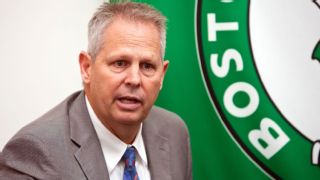|
Boston Celtics president of basketball operations Danny Ainge has maintained that he has high expectations for this summer, but he also has stressed that there are no guarantees that Boston will jump on the accelerator and that fans might need to remain patient in the building process. During a sitdown with WBZ TV that aired Sunday, Ainge discussed balancing a desire to compete immediately with positioning the Celtics to be a sustainable long-term contender. "Right now, we’re trying to become a better team as fast as we can without selling out. I guess that’s the best way to put it,” Ainge said on Sports Final. “We want to become a more significant team this upcoming year. And, at the same time, we want to build something that’s sustainable for a longer period of time. "I think that that’s my job in the organization. I think that ownership would like to see something happen faster. I know my coaches would like to see something faster. I know my players want to see something faster. I’ve been in their positions and I get it. I want to see something faster, too. But I just have to protect us from doing something irrational, just to get a little bit better. If it’s something that gets us to be a true championship contender faster, then I think we’re all on board. As long as it’s a sustainable formula and not a one-year quick hit that sacrifices future assets."  Ainge admitted last week in the aftermath of the NBA draft lottery that left the Celtics with the No. 3 pick that he briefly allowed his hopes to get up about landing a top selection, but he's excited about the possibilities for Boston while armed with a high pick. Ainge admitted last week in the aftermath of the NBA draft lottery that left the Celtics with the No. 3 pick that he briefly allowed his hopes to get up about landing a top selection, but he's excited about the possibilities for Boston while armed with a high pick.
"I’m excited about the No. 3 pick," Ainge said. "I would have been excited about it [on lottery] night -- if you’d have told me before the night started that, ‘Hey, you’re going to get the No. 3 pick,’ I’d have been very happy with that. There for one minute I let my mind drift, like, ‘Hey, we may get the No. 1 pick or the No. 2 pick.' But No. 3 is fine. We’re excited about that. "[Pick No. 3] certainly doesn’t have the same cachet in trade conversations, in trying to get better quicker, so that sets that back a little bit. Or we’d have to give up more [talent as part of a deal]. ... I think that there are good players, if we end up using that draft pick. We’re excited about the potential players." Ben Simmons and Brandon Ingram are projected by most to be the top two selections in the draft and there's a perceived drop-off from there to players such as Jamal Murray, Dragan Bender and Buddy Hield. Bender is an intriguing 7-footer, but could be a bit of a project, while Murray has obvious shooting skills but would be competing for time in Boston's crowded backcourt. Ainge stressed that, if Boston elects to utilize the No. 3 pick, it must target the player that the team believes has the potential to help the franchise deep into the future, not just in the immediate aftermath of the draft. "I can’t talk about any players specifically, but a player that is going to take time to develop or a player that may not come over to the NBA for a year or two, if we really believe that player’s the best player, we have to take him," Ainge said. "We cannot let a player slip by us just because it doesn’t fulfill our immediate satisfaction, or the objective for the fans to see something more exciting. We have to pick the best player, under any circumstance. "There are just too many examples of really good players that the fans haven’t been excited about on draft day. Last year, I remember [Kristaps] Porzingis was drafted in New York and they were booing all over the place and you’re like, ‘Well, why would they be booing so much on Porzingis?’ When you draft players, I remember when I was in Phoenix and we drafted Steve Nash and we were booed. I remember [the Suns fans] booed when Dan Majerle was drafted in Phoenix. ... You can’t base any of your decisions based on what the public thinks and based on what other people think you should do. You just really have to use our experience, our work, and our eyes, and we communicate all the time on what the best road to go is."
|
